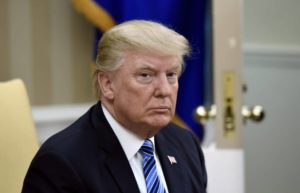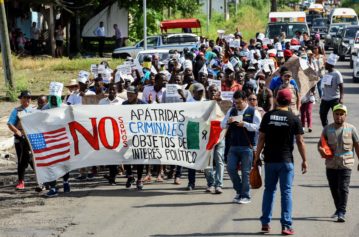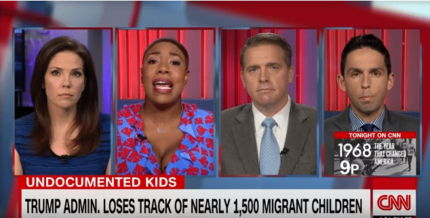
U.S President Donald Trump has given thousands of Liberians one year to make their move back to their home country. (Photo by Olivier Douliery – Pool/Getty Images)
Two centuries ago, a number of Africans in America wanted to leave, given they wished to escape the dangerous racial environment of the United States and, for some, the possibility of being sold back into slavery. Between 1817 and 1867, with the aid of the American Colonization Society, some 13,000 individuals left the states and settled in a coastal region of West Africa to form the nation of Liberia, proclaiming its independence on July 26, 1847.
With the Trump administration’s recent order to end special legal status for some Liberian immigrants, these current-day Africans in America — some descended from those original Liberians — are now being forced to leave within a year. “Liberia is no longer experiencing armed conflict and has made significant progress in restoring stability and democratic governance,” stated a Trump memorandum released by the White House on March 27.
The order impacts thousands of Liberians who, over the past three decades, came to the states upon fleeing two devastating civil wars that claimed hundreds of thousands of lives, a widespread Ebola virus outbreak in 2014, and ongoing political and economic instability. Many have been shielded from deportation under the Deferred Enforced Departure program, which recognized their special protected status. They now face eventual deportation as the law ending their current status goes into effect next year, with a yearlong “wind-down” period starting April 1 to enable the Liberian government to prepare for its returning citizens. While only a few thousand Liberians in America have DED status, there are as many as 100,000 Liberians currently residing in the United States, many with familial ties to those under DED. Minnesota alone has over 30,000 Liberians, with over 4,000 under DED.
“Many of these people have been in our state for decades, and they are an important part of our communities, where they serve as business owners, teachers and health care workers,” wrote a group of eight members of Minnesota’s congressional delegation last week, in an appeal to the White House for an extension of the program.
While the Trump memo is somewhat unclear over whether the program was technically “extended” — a likely way of avoiding a contradiction with prior campaign rhetoric and the ongoing right-wing appeal of its anti-immigrant platform — the Trump administration did authorize the wind-down or “orderly transition” period giving Liberians 12 months to legally make the move.
Extension or not, some in the Liberian community see it as a win.
“By Saturday, the program would have expired and a lot of people would have gone out of status,” said Abdullah Kiatamba, the executive director of African Immigrant Services in Minnesota. “This means their driver’s licenses would have been revoked, they would have been out of a job, they would have lost health insurance, they would have lost so many things,” said Kiatamba, further stressing the potential separation of families and the forcing of children into foster care.
“Given the current anti-immigrant climate and the man in power, this is a victory,” insisted Kiatamba, noting the “huge relief” and substantial implications for those Liberians under DED. He acknowledged the vague language of the memo as Trump “playing to his base and crafting a language that does not offend them.” But just allowing those under DED one more year, added Kiatamba, is essential “so we can figure out what is the best way to fight for a permanent legal status and provide a pathway to citizenship.
In a recent editorial by the Minneapolis Star Tribune, the Minnesota-based paper argued it is a pathway that Liberian immigrants well deserve. In “Liberians Have Earned the Right to Stay in the US,” the piece characterized the state’s large Liberian population as “business owners, teachers and nurses. Many work in nursing homes, where the labor shortage is acute. Some have grown old here, (and are) no longer able to start over,” read the editorial. “To abruptly return them to one of the poorest spots in the world, splitting up families and creating chaos in their communities, would be monstrous” as well as both “regrettable” and “cruel.”
Yet the March 27 Trump memo claimed that Liberia has “concluded reconstruction from prior conflicts, which has contributed significantly to an environment that is able to handle adequately the return of its nationals.”
“There’s nothing to go back to,” disagreed Kiatamba, noting there is “an 80 percent unemployment rate in Liberia. The country is still recovering from the devastation of an Ebola outbreak, and all of the health systems have collapsed.”
The Minnesota lawmakers echoed Kiatamba in their recent appeal. “With its recent presidential election, Liberia has only just completed its first democratic transfer of power in decades, and there are still serious concerns about the nation’s ability to maintain peace and deliver essential services to its population. A flood of Liberians from the United States could overburden the country’s limited infrastructure and reverse the advances the nation of Liberia has made.”
While the Liberian news site FrontPageAfrica recently reported arrangements were being made by the Liberian consul general to receive those returning home “with open arms,” an anonymous Liberian diplomat contended the influx “of thousands of Liberians will likely cause a strain on the economy. The government is not prepared. Mr. Trump needs to understand that this is a new government.”
For his part, Kiatamba well understands what needs to happen next for a unique group of African immigrants trying to remain in a country that their ancestors once rallied to leave.
“What we wanted was extra time to fight for a permanent resident status for Liberians under DED because there are currently two bills in Congress, one in the House, and one in the Senate,” clarified Kiatamba. The legislation promotes a pathway to American citizenship for Liberian immigrants, more than appropriate, offered Kiatamba, given the unique and shared history of the two countries. He pointed out that the Liberian flag was modeled after the American flag, that the majority of the country’s presidents descended from enslaved or free Blacks in America, and that the nation supported and contributed to America’s World War II efforts against Germany.
“I don’t think that story of these deeper historical ties has been effectively told enough to those who have power and influence in the U.S.,” said Kiatamba, noting it’s not only about these ties, but about Liberian immigrants’ “ongoing contributions to the American community. They are doing amazing things and are helping to build more vibrant communities across the U.S.”


